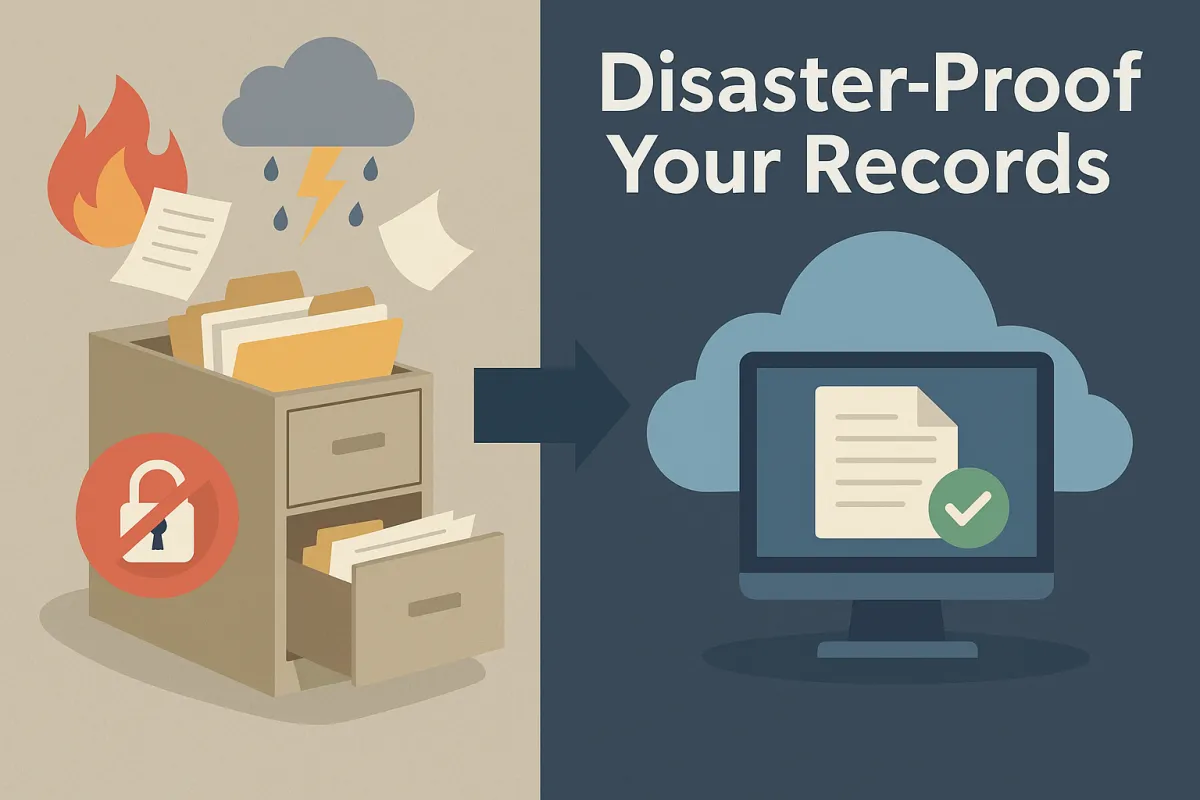
Disaster-Proof Your Records: How Digital Scanning Safeguards Against the Unexpected
By: USA IMAGING, Inc.
No business ever expects disaster to strike, yet it happens more often than we’d like to admit. Fires, floods, earthquakes, theft, even something as simple as a leaking sprinkler system or a burst pipe can destroy years of important records in an instant.
For companies that rely on physical documents—contracts, medical records, student files, legal paperwork, blueprints—the loss can be devastating. Not only does it create operational chaos, but it can also expose your organization to compliance risks, financial losses, and reputational damage.
The good news? Digital scanning provides a safety net. By converting your records into secure digital files, you protect your business against the unexpected, ensuring continuity and peace of mind.
1. Protection Against Natural Disasters
Paper is fragile. It burns, it gets soaked, it warps, and it can be swept away in seconds. Once gone, it’s gone forever.
Digital files, however, can be stored redundantly across multiple secure locations. For example, a scanned document stored in the cloud is not affected by a local fire or flood. Even if your office is destroyed, your business-critical records remain safe and accessible.
2. Safeguarding Against Theft and Vandalism
Offices are vulnerable—not just to natural disasters but to human ones, too. Break-ins, theft, and vandalism happen. Filing cabinets can be rifled through, boxes stolen, or documents tampered with.
With digital scanning, sensitive records are encrypted, password-protected, and access-controlled. Instead of hoping a locked cabinet is enough, you can control who sees a file and when—and keep logs to prove it.
3. Business Continuity During Emergencies
Imagine an earthquake hits, and your office is inaccessible for weeks. How will your employees get to the documents they need to keep the business running?
When records are scanned and stored digitally, they can be accessed remotely from secure servers or cloud platforms. This means your team can keep operations moving, even when your physical office is out of commission.
4. Compliance and Legal Security
In industries like healthcare, law, finance, and education, compliance regulations often require that records are protected from loss. If your documents are destroyed in a disaster, you could face steep fines or legal repercussions.
Scanning and indexing your documents not only protects them but also makes compliance easier. Digital files can be encrypted, time-stamped, and backed up—ensuring you meet industry requirements with confidence.
5. Financial and Operational Savings
The hidden cost of disasters isn’t just the loss of paper—it’s the downtime, the frantic reconstruction, and the expensive recovery process.
Digitizing your documents reduces this risk dramatically. Instead of spending thousands (or more) trying to recreate lost files, you’ll have them at your fingertips, ready to restore business operations quickly.
Real-Life Example
A local medical office we worked with had concerns about fire hazards due to their building’s old electrical system. They decided to digitize all patient files. Months later, a small fire broke out, damaging part of their record room. Thanks to digital scanning, every record was safe, backed up, and accessible to staff the next morning—avoiding what could have been a devastating operational setback.
Final Thoughts
Disasters are unpredictable, but your document security doesn’t have to be. By scanning your records, you’re not just going paperless—you’re protecting your business, your clients, and your reputation from the unexpected.
At USA IMAGING, Inc., we’ve helped countless businesses safeguard their documents with professional scanning, indexing, and secure digital storage solutions. Don’t wait for disaster to strike—protect your records today.
📞 Contact Us: 858-513-6565
📩 Request a Quote: Click Here
